Jeremie Averous's Blog, page 105
May 19, 2015
What Collaborative Age Education Should Concentrate On
Education requires a major revamp nowadays with the Fourth Revolution. We don’t need anymore the Industrial Age schooling that was designed to educate the resources needed by the industry (in summary, compliant and literate).
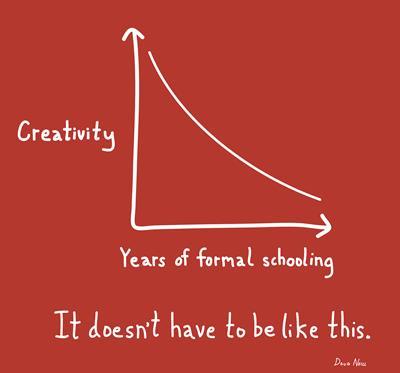 Collaborative Age requires people that are collaborative, creative and know how to deal with the vast amounts of data and information available at everybody’s fingertips. This excellent paper from ParisTech review ‘Education Series – 2 – New knowledge, new know-how: skills for the 21st Century‘ summarizes some essential traits of future education:
Collaborative Age requires people that are collaborative, creative and know how to deal with the vast amounts of data and information available at everybody’s fingertips. This excellent paper from ParisTech review ‘Education Series – 2 – New knowledge, new know-how: skills for the 21st Century‘ summarizes some essential traits of future education:
Managing data to find useful information
Maintaining and developing creativity
Navigating diversified knowledge spheres
I think this paper forgets about a very important aspect of future education, which are the soft skills require to collaborate effectively. Industrial Age education promoted individual excellence (for example though the typical exams); Collaborative Age education needs to promote teamwork and team success.
In any case, “Developing a culture like this requires that the learners be not afraid to fail. […] If you want to discover new ideas, you must be prepared to take risks and to make mistakes. […] In the same vein, schools today do not value differences. In many instances, there is only one right answer to a question, whereas a creative approach enables students to propose new answers to a given problem, seen from a totally different angle or point of view. Conformity must be abandoned and intellectual curiosity stimulated“.

May 17, 2015
How to Measure the Value of Online Identities
The Newrepublic article “The BOT Bubble: How Click Farms Have Inflated Social Media Currency” is an absolute must-read and mind-blowing piece about the underground economy of fake social media accounts.

The click farm owner on his bed of SIM Cards
It describes in detail the operation of a ‘click farm’ in the Philippines where fake Facebook users are created by the thousands to create followers for greedy companies (hint: it takes one SIM card per user to get through the Facebook check algorithm, hence it looks more like a SIM card storage!).
According to the article, about 7 to 10% of social media users are fake, and those profiles are leveraged to create sudden ‘following’ and ‘liking’ or brands, presidential candidates etc. This can seriously distort the real following of public brands. Of course it is also a way to distort the effectiveness of online advertising and therefore, to make advertisers lose money.
Those ‘click farms’ are another massive, cheap employment created in developing countries by social networks, parallel to the legitimate service providers that provide moderation services; and other less legitimate that provide filtering services in some countries.
An online identity has got value, and some people are ready to pay heavily for fakes that they can control and have just the right profile. Accordingly, the value of real online identities is much higher, just because of the data we are giving to social networks.
Hat tip to Mitch Joel in his usually great weekly 6 links worthy of your attention.

May 16, 2015
What Our Quests are Really About
“It is not the mountain we conquer, but ourselves” – Edmund Hillary. In every of our quests, external visible rewards or goals are not what is important. What we learn and how we grow is what is essential.
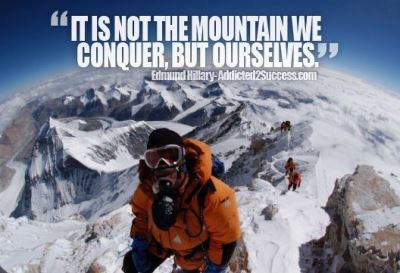 I remember being in a conference with a famous polar explorer just returning from several months isolated is the cold of Arctic in the context of an important scientific expedition. The question from the floor was: “what were you looking for, what were your objectives?“. The answer came with something like: “myself“. I was blown out!
I remember being in a conference with a famous polar explorer just returning from several months isolated is the cold of Arctic in the context of an important scientific expedition. The question from the floor was: “what were you looking for, what were your objectives?“. The answer came with something like: “myself“. I was blown out!
We don’t need to be Edmund Hillary or this polar explorer to have real quests in our lives. And like them, we need to realize that we are looking for ourselves when we start such quests – and not so much for the achievements and the rewards. This gives quite a different perspective on things!
Search for yourself, and start your quest!

May 14, 2015
Why A Significant Change Will Happen Soon in Our Civilization
“We are on the edge of change comparable to the rise of human life on Earth” — Vernor Vinge. Why? Read this excellent post on Artificial Intelligence – a crossing between our considerations on the fact we have no intuition for the exponential and our concern for the Singularity (why are we alone in space??).
In particular I can’t escape showing this great illustration – with all due attribution: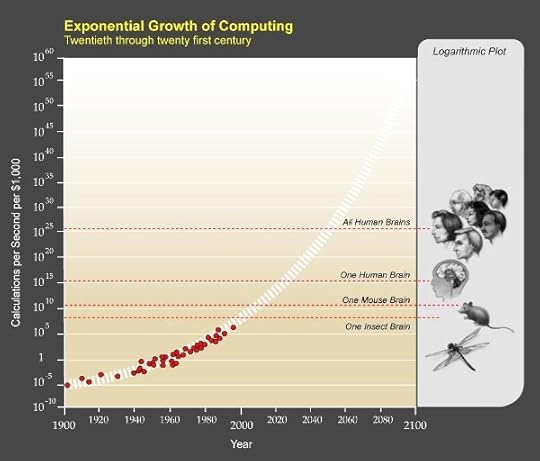
Oops! What’s going to happen soon? And the post argues with reason I believe that we might not see it coming until it is upon us, due to the fact that we do not have intuition for the exponential.
Are we ready for this? I think not.

May 12, 2015
Why Data Monopoly is Not Like Physical Monopolies
A paper in Harvard Business Review takes the position that ‘Data Monopolists Like Google Are Threatening the Economy‘. According to this paper, beyond the usage of massive data to create value through data mining, the fact that these troves of data are concentrated within a limited number of major actors is a major issue akin to the concentration of means of production in the early XXth century in the hand of a few monopolists.
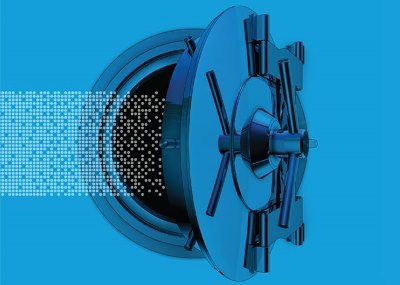 I don’t agree with this analysis. First, there are always new actors coming into play that take significant shares of the available data. For example one could argue that Facebook today concentrates a lot of personal data, and it is only a fairly recent entrant compared to Google and Yahoo.
I don’t agree with this analysis. First, there are always new actors coming into play that take significant shares of the available data. For example one could argue that Facebook today concentrates a lot of personal data, and it is only a fairly recent entrant compared to Google and Yahoo.
Second, there is no major capital investment barrier like for infrastructure or industrial facilities that were at the origin of the anti-monopolistic laws. There is no limited resources like for oil, or extremely expensive investments required like for heavy industries. Data and its management is not entirely free, but reasonably cheap so that new entrants can still appear. In addition the amount of data generated worldwide increases exponentially, creating ever more opportunities.
Yes, significant value can be created by clever organizations out of Big Data. No, these are not monopolies that impede the operations of the market, as long as internet usage is maintained equal for all users.
Please comment if you don’t agree!

May 9, 2015
Why the Law of Financial Viability is Important
When starting a new pursuit or a new venture, it is important to remember ‘The Law of Financial Viability': “When deciding whether to follow an appealing pursuit that will introduce more control into your work life, seek evidence of whether people are willing to pay for it. If you find this evidence, continue. If not, move on” – writes Cal Newport in his book So Good They Can’t Ignore You.
 Hence it is essential to determine as quickly as possible (based on a demonstrator or Minimum Viable Product as they say in the Lean Startup movement) whether people are really ready to pay for what you want to offer. That is also applicable to a career change – are people willing to hire you?
Hence it is essential to determine as quickly as possible (based on a demonstrator or Minimum Viable Product as they say in the Lean Startup movement) whether people are really ready to pay for what you want to offer. That is also applicable to a career change – are people willing to hire you?
And there is a significant distance between people saying that that they’s be interested and they would be happy to pay – and people really, actually paying.
One of the interesting consequences of this observation is that it is far better to have the first customers pay a little something rather than giving for free: it will prove that people are happy to reach their wallet, which is a significant psychological hurdle; and as an associated benefit it will force you to get your payment and invoicing processes up and running.
To summarize, Cal quotes Derek Sivers as saying: “When it comes to decisions affecting your core career, money remains an effective judge of value. If you’re struggling to raise money for an idea, or are thinking that you will support your idea with unrelated work, then you need to rethink the idea”
Demonstrate the value of your idea by effectively getting money for it.

May 7, 2015
How Age Changes our Outlook on What We Can Achieve
I’d like to thank Mary Cravets for an insightful comment on my post ‘How We Underestimate What We Can Do in Ten Years‘. In this post we comment the statement that ‘People always underestimate what they can do in ten years and overestimate what they can do in a week’. Mary commented that our perspective on this timeline will probably change considerably between our 20’s and our 40’s.
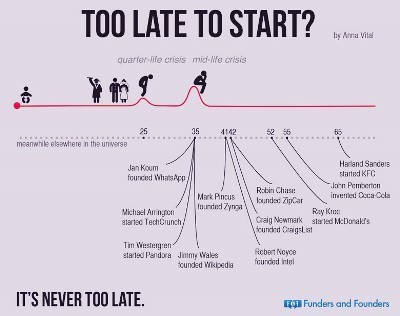
It is never too late to start something awesome and different! Here in the case of entrepreneurs
For sure when we reach 40 or 50 we will have grown consciously through a few decades, and in hindsight most of us can measure how much change we have introduced in our lives in the space of a typical decade. When we are 20, our experience in the matter is more limited. Hence we might believe more in the statement with maturity.
On the other hand, when we are 20 we think we can take the world by storm; at 40 or 50 most people are a bit more prudent. If they have met significant hardship or disappointment on the way they might even be pessimistic about how much they can change the world around them and this might prevent them to take initiative. Our level of energy and endurance might also have sagged on average (it is not true for everyone!).
Age and experience does change our outlook on what we can achieve. There will be, depending on the person, positive and negative tensions that will or not lead to take initiative.
Personally, I try to reinvent myself about every 7-8 years, professionally at least. That is what I have done in the past. Those changes are a bit tough sometimes, but they can be managed. And it is fun! The more I age, the more I want to continue to do that, because it is fun and I like to discover new things. And right now I am quite sure that what I will be doing in a decade will be quite different from what I think today. What about you?

May 5, 2015
Why You Need to Kindle Your Internal Light
“People are like stained-glass windows. They sparkle and shine when the sun is out, but when the darkness sets in, their beauty is revealed only if there is a light from within” – Elizabeth Kübler-Ross.
 I find this is a great quote that triggers a lot of thoughts and helps us put in perspective what happens in our lives. It is relatively easy to sparkle in society when we are recognized by our peers, through our social status and other external ways of being recognized.
I find this is a great quote that triggers a lot of thoughts and helps us put in perspective what happens in our lives. It is relatively easy to sparkle in society when we are recognized by our peers, through our social status and other external ways of being recognized.
But what about that little light within us? Will it shine in the shadows beyond our fears? When the everything that makes us sparkle in broad daylight is gone?
It is difficult to foster that small light and make it large. Only a few people manage to grow it so that it illuminates others. It requires a lot of work on ourselves and to create a real difference in the world.
Still at the end it is what matters.
Go right now to kindle your internal light!

May 2, 2015
Why True Leaders Know How to Handle Their Fear
Over time I found that the main difference between good and bad leaders is how they manage their fear and anxiety.
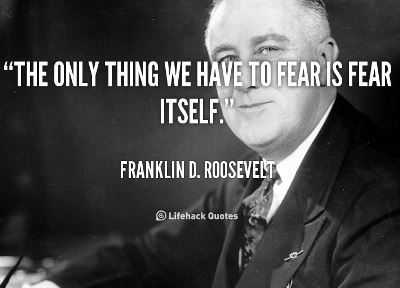 Leaders that try to change things or create something new are always submitted to huge quantities of stress and of fear – personal fear as well as organizational fear.
Leaders that try to change things or create something new are always submitted to huge quantities of stress and of fear – personal fear as well as organizational fear.
Bad leaders transmit fear and stress to their team. It cascades down, creating negative feelings throughout the organization, hampering true work, destroying creativity and innovation. People just wait for the next outburst of stress and try to avoid being in the way. That occupies most of their time.
Good leaders on the contrary, still faced with the same situation, know how to tame their fear and most importantly, act as a filter for their team, making sure people remain in a situation where they can do their best work. At the end, there will be a tremendous difference in the outcome from the organization.
Above all, don’t think that transmitting fear to your team is a good personal solution that would avoid yourself facing it. Because the final outcome will be bad, it will only reinforce your anxiety and that can easily be very destructive.
If you want to become a better leader, you need to learn to manage your fears and anxiety by yourself.
Hat tip to Gapingvoid for the inspiration

April 30, 2015
How Quick Bureaucracy Can Creep In… and How to Prevent It
I have had some experiences lately where I have seen bureaucracy creep in projects in a very significant and quick manner, creating a serious impediment to progress and success. Although I know that it is the fate of many organizations, I was astonished by the mere speed at which bureaucracy can be created and imposed, even in project organizations that had been newly set-up only weeks or months ago.
Bureaucracy is not the same as developing and implementing effective processes. Bureaucracy is about creating processes of little effectiveness (even if very efficient!).
 In the instances I observed, bureaucracy developed quickly in situations where the scope of work was not very well defined. Thus, significant initiative and cognitive work were required to move things forward. In this situation many contributors, maybe not keen to do the effort, will seek to look busy doing ‘stuff’. And this ‘stuff’ generally turns out to be the seed of bureaucracy. It is easy to look busy writing endless reports and participating to endless meetings!
In the instances I observed, bureaucracy developed quickly in situations where the scope of work was not very well defined. Thus, significant initiative and cognitive work were required to move things forward. In this situation many contributors, maybe not keen to do the effort, will seek to look busy doing ‘stuff’. And this ‘stuff’ generally turns out to be the seed of bureaucracy. It is easy to look busy writing endless reports and participating to endless meetings!
So, one way to avoid this situation is to be extremely clear on the scope of work and on the tangible deliverables that need to be produced. It also explains why in phases of innovation, it is better to keep the team small, so as to avoid the temptation by those that might not be at the core of the creative process to develop bureaucracy (to look and keep busy).
Bureaucracy can truly stifle a project. Make sure it does not develop beyond the minimum necessary – in particular as in modern times the mechanical data management should be automatized.
For those interested, the best text on bureaucracy ever is from Parkinson in the Economist in 1955 and is accessible at this link: Parkinson’s law. (as known today, Parkinson’s law states that ‘work always expands to fit the time available‘).




